Final report for FNC19-1177
Project Information
North Iowa Fresh, LLC (NIF) and Bode’s Moonlight Gardens (BMG) are two leading North Iowa farm businesses offering Community Supported Agriculture (CSA) shares. NIF markets in more than five North Iowa communities focused between Clarion and Mason City. BMG’s market, is located just north of Algona, sixty miles west of Mason City. Producers from NIF and BMG have worked together over the years and share similar market concerns. This project offers them an opportunity to put creative energies together.
North Iowa Fresh, LLC. is a collaborative marketing business that was formed in 2014 by six local food farmers (now ten in 2020). NIF’s mission is to bring healthy, nutritious food to the marketplace and to support sustainability of its farmer members. NIF’s producer base reduces risk and increases availability of vegetables. NIF producers have aggregated product (mostly diverse vegetables and fruits) over the past four seasons for wholesale to restaurants, grocers, and schools. NIF introduced its CSA share, the Bounty Box, in 2018, with twenty-eight full equivalent shares marketed primarily to work-sites. NIF increased to 74 shares in 2019. NIF's 2020 goal is 125 shares.
NIF members, Jan Libbey, One Step at a Time Gardens, will be Project Coordinator, and Mary Jane Newswanger, of Maple Grove Farm, will be a Project Team Member. NIF works with a broker, Andrea Evelsizer, who will serve as Project Manager. Tim Landgraf, One Step at a Time Gardens, will assist with crop planning. NIF is addressing customer demand for convenience by introducing box customization in the form of a Build Your Own Box share in 2019. This SARE Farmer/Rancher grant will support the next focus of research and development of the local meal kits.
Co-owner of Bode's Moonlight Gardens, Joanne Roepke Bode, will be a Project Team Member. With her husband, Beany, Joanne, returned to their home state of Iowa in 2003 to start their own vegetable farm and a family. Today, the Bodes and their three children have a diverse operation, selling fresh vegetables through the Kossuth County Farmers’ Market, local restaurants, and a seventy-member CSA program. In 2014 a commercial pumpkin operation was added to the farm. Beany farms corn and soybeans with family members.
The BMG CSA, which remains popular with customers after more than ten years, has set a goal to add other meal ingredients to their offerings. The proposed local meal kit research and development with NIF will be a benefit to both businesses and their customers
Studies (see list below) indicate a nationwide stagnation in CSA development. Some CSA farmers are responding with strategies including on-farm pizza parties and customized boxes. However, few CSAs appear to be responding to the emergence of commercial meal kits. Two North Iowa businesses - North Iowa Fresh, LLC and Bode's Moonlight Gardens - recognize the need to anticipate this additional dynamic. Working together, these businesses propose to create a series of locally tailored meal kits to compliment their CSA offerings. The commercially available meal kits offer convenience, but they are pricey, generate wasteful packaging, and lack the farm connection. Local meal kits emphasize the environmental and social strengths of the CSA model.
We believe local meal kits are an important economic strategy that will help attract and retain customers. We believe the model we develop will be transferable to other CSA farms in the North Central region and will support the sustainability of CSA businesses.
Studies referenced: USDA Report April 3, 2017; Madison. com, Nov. 21, 2018 - Out of the box: After 25 years, community supported agriculture farms adapt to a changing market; 2015 CSA Farming Annual Report, Small Farm Central; State of CSA, Local Harvest, July 2016
End of project summary: This project proposed to develop and implement a meal kit as a complementary product for CSAs when many CSAs were experiencing a plateauing of demand. The outcome of this project reflects dynamics that could not have been on our radar when this project was initiated. Primarily, the demand for CSA has been reignited on its own for many operations largely due to the impact of the ongoing Covid pandemic. Additionally, we have been reminded that incorporating value added products to an already demanding farm business may warrant segregating operations between the core operation and the addition of the value added product. And finally, critical market capacity must be considered. Use of quality, locally sourced and organic ingredients impacts costs in a way that must not be impacting large, heavily marketed commercial meal kit products.
Here's a review of our project accomplishments: Between 2019 and 2020, we created eight meal kits, recipe cards with photos and step by step directions, a name (Seasonal Chef) and logo and packaging for the meal kits. Kits were sold during a 2020 pilot. This provided insight into the real life complexities of this product. We concluded, at the market capacity in North Iowa and within our businesses, this was not a profitable meal kit model. Financial analysis can be found on slides included in Google slide presentations provided in the Education & Outreach section of this report. Meal kits that sold at $40, cost approximately $60 (product coordination and packing a major cost, figured at $20/hr).
Recipes developed for 2020 and an additional set for 2021 were reinterpreted as a resource for CSA members to use with deliveries they would receive as part of the normal CSA delivery as opposed to our original design of a separately planned and packed, unique box. The recipes created have been uploaded to a recipe database housed on the website of a local food non profit partner with a broad presence in North Iowa.
Covid impacted all aspects of this project. The interaction between farmers and customers we had hoped for our recipe testing and field days was lost as we shifted to virtual presentations. Virtual presentations referenced under the Education & Outreach section did help us share our insights with 60 farmer participants. We emphasized our development process and the critical questions a CSA/local food business should be prepared to address if considering adding a meal kit product to their business.
- Research and test two to three commercially available meal kits with a set of criteria including price, taste and packaging. North Iowa Fresh (NIF) & Bode's Moonlight Garden (BMG) subscribers and farmers will be involved.
- With the help of a recipe consultant, develop seven to ten Local Meal Kits to complement each business’s CSA deliveries.
- Trial some of the kits using the same analysis as in step 1.
- Develop marketing materials to promote these new kits for the 2020 season.
- Trial the remaining kits through a hands-on field day event.
- Share findings through field day, website, and conference presentations.
Cooperators
- - Producer
- - Producer
- - Producer
Research
|
PRE-PROJECT PLANNING |
Review project with the whole team, verify roles and timeline. |
|
RESEARCH |
Research commercial meal kits & existing comparison data. |
|
|
Determine criteria to consider when developing kits. Selection of test kits will be based upon how well they alien with our values. |
|
|
Develop kit analysis framework considering criteria used by online reviewers. |
|
|
|
|
COOKING 1 |
Purchase 2-3 meal kits for testing/sampling. |
|
|
Cook and evaluate these kits based on predetermined criteria. |
|
|
Summarize kits and identify goals/values for developing local meal kits. |
|
|
|
|
DEVELOPMENT 1 |
Review 2018 production plans and customer surveys for points during the season where there is greatest opportunity for adding meal kits. |
|
|
Decide on price point and frequency for meal kit add-ons. |
|
|
Create 3-5 local meal kits using core produce from the CSAs and incorporating additional local items (when feasible) and raw or pre-packaged ingredients that are needed to complete the recipes. No processing will be done. |
|
|
Research cost of additional ingredients needed to complete the recipes and decide on which recipes to test. |
|
|
Source required local and non-local ingredients needed. |
|
|
|
|
COOKING 2 |
Trial recipes for 3-5 kits with producers and CSA subscribers. |
|
|
|
|
BRANDING AND MARKETING |
Develop graphics for label and packaging, recipe videos and marketing plan. |
|
|
|
|
PLANNING and SALES |
Production planning for meal kit ingredients so that as many as possible can be raised by NIF/BMG farmers and that produce will be available when needed. |
|
|
Line up commitments for other products that are needed for the kits. |
|
|
Market some of the kits to customers as 2020 add-ons... evaluate. |
|
|
|
|
DEVELOPMENT 2 |
As in Development 1… for 4-5 additional meal kits. |
|
|
|
|
COOKING 3 - FIELD DAY |
Trial 4-5 additional kit options at a "Test Kitchen" style Field Day. |
|
|
|
|
FINAL DEVELOPMENT AND MARKETING |
Make adjustments to the second set of recipes, update the marketing materials and final video development. |
|
|
|
|
OUTREACH |
MOSES, PFI Conference (attend one of these yet to be determined based on conference session focus, presenter availability and readiness of project.) |
|
|
|
|
FINAL REPORT |
Final report including Local Meal Kit Design Template. |
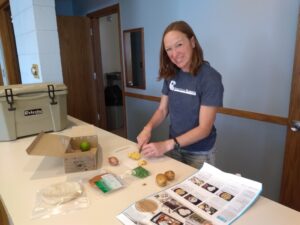
Commercial Kit Team Evaluations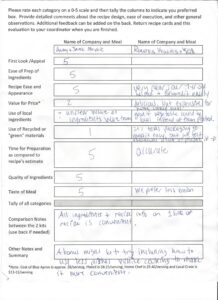
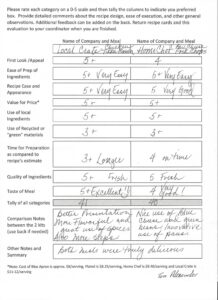
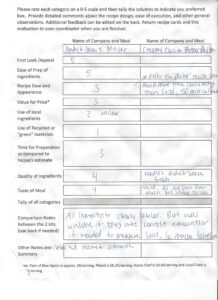
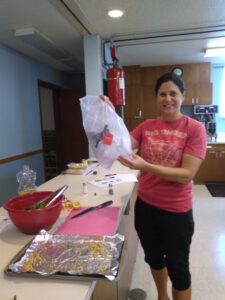
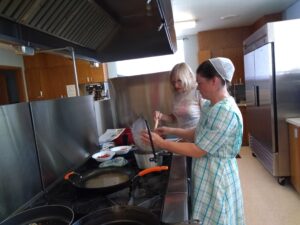
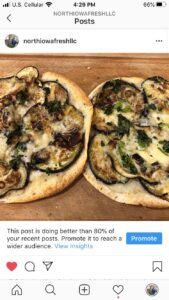
This project is research and development of a local food based meal kit. Our progress has multi-layers:
- Testing commercially available meal kits to better understand the construct, performance, and pricing of those kits and their materials. We developed an evaluation form to capture input from our participant testing team. That helped us analyze how products were packaged, how the recipes were designed, how the directions worked, and more about the flavor profile of the dishes created.
There are two CSA-based farms working on this project together. For our first layer testing, we also involved a couple of CSA members in testing some kits.
2. Developed a set of criteria for development of our local meal kits. That criteria includes:
-
- Looking for a rich flavor profile/experience
- Showcase "abundant" veggies - those that warrant more diverse ways to cook
- Kits to offer two options each month – one with meat and one vegetarian
3. Developing eight meal kits to be offered during the 2020 season - two per season, June through September that meet the farmers' "seasonally available" crops and suggested recipes.
4. Researched those recipes through running the recipes through home testing to verify the ease of preparation, combination of flavors.
End of project summary re: farmer participation: Jan Libbey and Joanne Roepke Bode, played a key role in establishing the meal kit project model and working through the 2020 pilot and adjustments in 2021. Mary Jane Newswanger, Jeff Short, and Ron Rachut provided input on the meal kit development phase through regular updates. Several other local producers provided product that was featured in the meal kits.
Educational & Outreach Activities
Participation Summary:
We have been excited to share about this innovative project. We've used:
- direct communication with farm members through farm newsletters and when we were visiting with members.
- social media - posting photos of our recipe testing progress. North Iowa Fresh has more than 950 followers on instagram.
- marketing event trade shows - we've promoted the Seasonal Chef at two events in smaller communities in Feb. 2020, each attended by 50. We have four upcoming events with attendance to exceed 1,000.
- Practical Farmers of Iowa Fruit & Vegetable Meet-up - held in Algona provided Bode Moonlight Garden an opportunity to share this project as an update. Attendance 10.
- Marketing to renewing and new worksite partners. North Iowa Fresh Broker has held meetings with more than 8 of worksites, each attended by an average of 10 employees.
The upcoming marketing events and continued social media promotion will be our primary outreach strategies. We will begin planning for our summer field day to be held mid summer.
We have developed a logo and name for our local meal kit - Seasonal Chef - and a CSA brochure insert.2020 Seasonal Chef one page insert with NIF contact info (V2)
End of project summary: All of the above reflects the pre-Covid perspective. We were on the cusp of planning for summer field days that were designed for great farmer/customer interaction. But all of that changed in 2020 and our outreach shifted to a virtual platform. Thankfully, we were able to tap into some great partners.
Practical Farmers of Iowa and Iowa Fruit & Vegetable Growers Association provided valuable platforms to share about this project.
PFI Virtual Field Day 2020 presentation (Google slides)
Recording of PFI Virtual Field Day 2020(Facebook)- 20 participants
Google slides used at PFI Lightening Round Presentation at 2021 Annual Conference - 15 participants
Iowa Fruit & Vegetable Growers Association 2021 Annual Conference presentation (Google slides) and video (YouTube) - 25 participants
Audio Recording plus slides from IFVG 2021 Annual Conf. presentation -
Learning Outcomes
As of winter 2020, we have evaluated commercial meal kits and designed eight local based meal kits for the 2020 season that are being piloted as a monthly offering. As we refine our recipes, we continue to be mindful that the first two months of June and July are really tricky to have crops reliably ready for those meal kits.
We are beginning to promote these meal kits and getting a lot of enthusiastic response from CSA members. We'll understand this better as we get further into this sales season.
There are a LOT of details we yet have to flesh out to pull the kits together before we'll be ready for the first delivery in June.
End of project summary: This project proposed to develop and implement a meal kit as a complementary product for CSAs when many CSAs were experiencing a plateauing of demand. The outcome of this project reflects dynamics that could not have been on our radar when this project was initiated. Primarily, the demand for CSA has been reignited on its own for many operations largely due to the impact of the ongoing Covid pandemic. Additionally, we have been reminded that incorporating value added products to an already demanding farm business may warrant segregating operations between the core operation and the addition of the value added product. And finally, critical market capacity must be considered. Use of quality, locally sourced and organic ingredients impacts costs in a way that must not be impacting large, heavily marketed commercial meal kit products.
Here's a review of our project accomplishments: Between 2019 and 2020, we created eight meal kits (1 Vegetarian and 1 meat-based per month, June - September), designing recipes to fit seasonally available product, and incorporating additional items to achieve the desired flavor profiles. Recipe cards with photos and step by step directions were created and printed. We developed a name (Seasonal Chef) and logo and selected a gabled box to pack the meal kits. We piloted the meal kits in the 2020 season, selling an average of 20 kits/month. Two CSA businesses were initially going to trial the meal kit - North Iowa Fresh and Moonlight Gardens. North Iowa Fresh, did run the pilot in addition to its CSA that season. Moonlight Gardens chose not to add this to their CSA. It was clear from the planning, that assembly of the kits was going to require extra attention that Moonlight Gardens did not have the capacity for. That proved a wise decision as their CSA saw a dramatic increase in demand for their CSA shares. NIF worked through the details, tracking time for ordering meal kit product and packing the boxes. Meal kit assembly did require dedicated personnel beyond the existing aggregation crew NIF had on hand. The easiest fit was delivery as this product fit right into their regular delivery schedule. Overall, the logistics and cost of assembling all the pieces of these meal kits proved to be an unprofitable venture within the construct of the existing business operation. Discussions took place with a specialty grocer to take on the product, but insufficient customer base to sustain the expenses was cited as the next limiting factor. Customer surveys were used to assess the response to the meal kits. Overall, response was very positive. Some feedback helped to inform our next steps of this project specifically around reducing preparation time of the recipes. When we realized the meal kit itself was impractical, we shifted our interpretation of a "meal kit" to be not from a separate and unique product, but recipes built around the planned CSA deliveries and promoted to "turn your box into a meal kit". We worked with Healthy Harvest of North Iowa, a local non profit partner, to upload the original 8 menu/recipes into their database. This made the recipes easily accessible for future NIF newsletters, as well as a much broader audience in North Iowa. We requested a project extension to evaluate use of this database and give us time to develop additional recipes to fill in gaps across the season and meal spectrum. In the end we created 8 menu/recipes plus the additional 10 recipes.
Click here for a summary of all the recipes created
Recipes from the 2020 Meal Kit are listed in the summary and incorporated throughout the Healthy Harvest of North Iowa recipe database.
The additional 10 recipes created in 2021, are featured in this portion of HHNI's publicly accessible recipe database.
North Iowa Fresh made extensive use of the recipes developed through this project throughout the 2021 season, proving it to be a great resource. Website analysis from Healthy Harvest of North Iowa (HHNI) indicates we got around 30 visits to the NIF landing page website from HHNI's recipe posts. Four of the recipes were viewed more than 20 times, the balance were viewed between 8 & 18 times on average.
Project Outcomes
The experience of putting creative capacity between two CSAs together was rewarding. And the enthusiasm from CSA customers we saw in response to early marketing encouraged us that these local meal kits are hitting a ripe opportunity.




End of report summary: The complexity of creating the kits impacted the practicality of incorporating this as a new product for either participating farm business. Thanks to our local non profit partner, Healthy Harvest of North Iowa, the recipes we developed and tested, have been made widely available through HHNI's recipe database.
End of project summary: A meal kit product is a complex undertaking with lots of logistics to be considered. It's important to reassess where CSA demand is heading as we continue to move through the impact of Covid pandemic and to be very clear about whether such an undertaking fits overall business goals and capacity. Meal kits did not prove feasible for either of the participating CSAs. Any CSA or partner business considering undertaking a locally sourced meal kit product would be wise to clearly understand staffing needs, capacity within or beside an existing CSA business, market capacity, and should plan to adopt information/recipe management software to streamline management of ingredient ordering and organizing logistics.